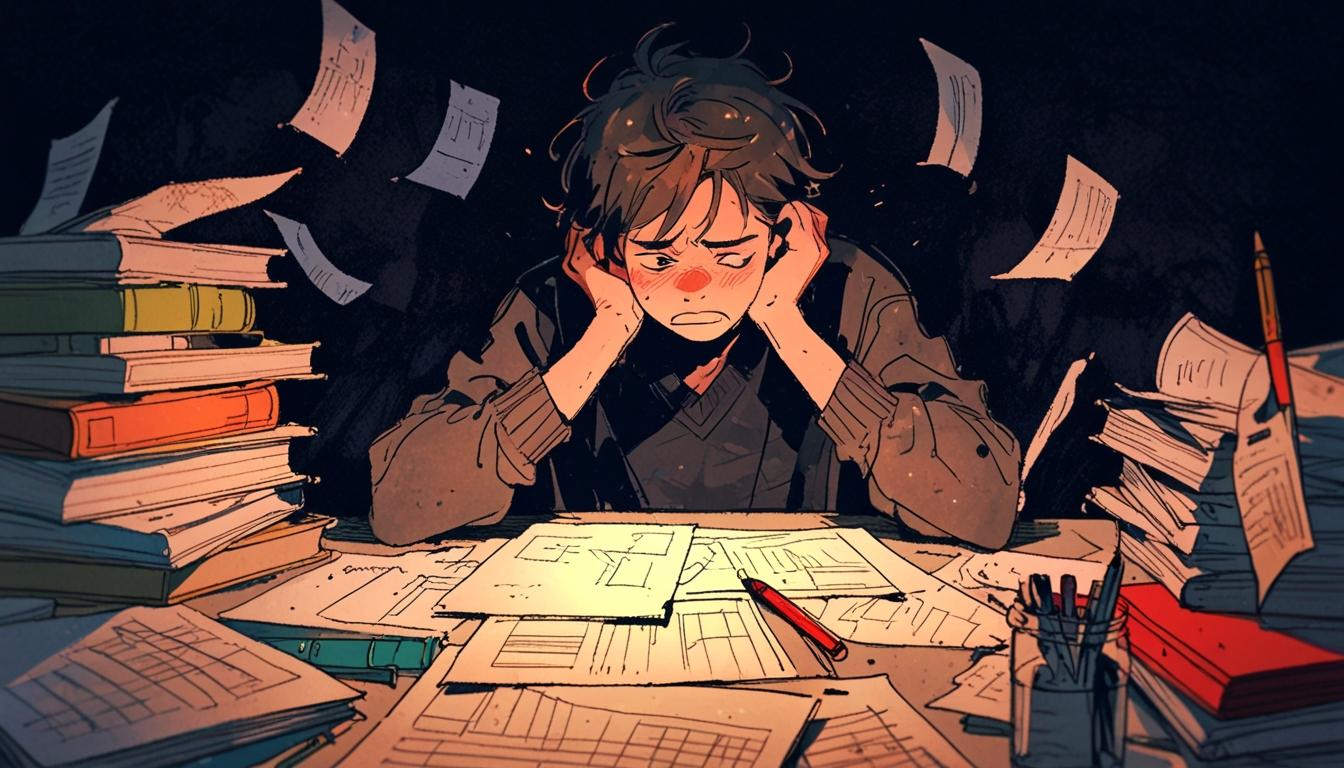As Scottish students grapple with intense National 5 and Higher exam demands, rising competition from international applicants and reduced university places for locals exacerbate inequalities, prompting calls for a more diverse and equitable educational strategy.
It was not, I concede, a foolproof plan. Reflecting on academic pressures, I recall a desperate attempt to prepare for an ‘O’ Grade chemistry exam four decades ago. On the morning of the exam, having failed to grasp the material throughout the course, I endeavoured to learn the periodic table by inscribing it on my forearm. Ironically, sweat turned this carefully crafted cheat sheet into an indecipherable smudge, contributing not only to my failure in the exam but also to the ruination of a shirt I had hoped would bolster my confidence.
Fast-forward to the present, where my own children are navigating their National 5 and Higher exams with an approach markedly different from my haphazard strategy. Their commitment, characterised by diligent study and missed social outings, stands in stark contrast to my youthful negligence. Yet, as I observe them, a wave of concern washes over me; the pressures they face today are indeed more profound than those I encountered in the mid-1980s.
In contemporary Scotland, the academic landscape is shaped by heightened expectations and competitive forces. Young people pursuing Nat 5s and Highers are now besieged with pressures that far exceed what we faced decades ago. Whereas my generation had a variety of career pathways, including apprenticeships and traineeships that provided routes into promising occupations, today’s youth often feel ensnared by a singular narrative: a degree is paramount. It’s a narrative underscored by the rising costs of higher education and the increasingly competitive landscape.
Moreover, statistics reveal a worrying trend. In the academic year 2022-23, Scotland hosted around 292,240 higher education students, with a significant portion being international students. While the Scottish National Party (SNP) touts its free tuition policy as a means of broadening access to education, the reality is a limit on the number of places available for local students, as universities increasingly prioritise fee-paying international candidates. This shift has not only restricted access but has skewed competition towards areas of study that attract foreign investment, such as medicine and the sciences, sidelining local students hoping to pursue their passions.
The disparity in opportunities is glaring. Recent reports indicate a decline in performance among Scottish students in international assessments, particularly in STEM subjects. This decline is further compounded by socio-economic inequalities, where students from less privileged backgrounds are consistently outperformed by their more affluent peers, perpetuating cycles of disadvantage. With university places shrinking for local students, those who are unable to secure a place face bleak futures, especially when the number of college opportunities has also dwindled significantly.
Many educators lament that the current exam-centric focus leaves little room for a nuanced approach to education, one which should not only assess knowledge but also prepare students for life beyond school. The prevailing model risks fostering disillusionment among students who perceive their worth and future as inherently tied to exam results. With their keen focus on academics, my children remain hopeful yet unaware of the challenges that await if they do not meet the rigorous standards set before them.
As I watch my daughter pore over physics and my son tackle maths past papers, I feel a mixture of pride and trepidation. Their ambitions are commendable, but the reality is stark; the pressures of achievement are relentless. Across Scotland, over 130,000 teenagers are entrenched in a demanding exam timetable, with their outcomes influencing job prospects and stability long into the future.
In the context of both educational achievement and economic challenges, the need for a comprehensive strategy that provides equitable opportunities for all students has never been more pressing. The narrative of success must evolve beyond mere qualifications; it should encapsulate the diverse pathways that can lead to fulfilling careers, ensuring that young Scots are equipped not just with degrees, but also the skills and opportunities that the economy truly demands.
As I wish my children the best of luck in their examinations, I cannot help but reflect on the imperative for systemic change. They are poised to navigate a future fraught with hurdles, making their academic efforts all the more critical, yet paradoxically uncertain in terms of the opportunities that will await them on the other side.
Reference Map:
- Paragraphs 1, 2, 3, 4, 5
- Paragraphs 5, 6, 7
- Paragraph 8
- Paragraph 9
- Paragraph 10
- Paragraph 11
Source: Noah Wire Services
- https://www.dailymail.co.uk/news/article-14708741/EUAN-McCOLM-foolproof-plan-led-failed-exam-ruined-shirt-kids-going-Nat-5s-today-pressure-80s.html?ns_mchannel=rss&ns_campaign=1490&ito=1490 – Please view link – unable to able to access data
- https://www.ft.com/content/f5837f8a-bd3f-45c9-9a8d-d8b0ff7d3824 – An article from the Financial Times discussing the legacy of the Scottish National Party (SNP) as John Swinney takes on the role of First Minister. It covers various aspects of Scotland’s governance, including economic performance, education outcomes, healthcare challenges, crime rates, and poverty levels. The piece highlights the complexities and challenges faced by the SNP in addressing these issues and the scrutiny of their policies and effectiveness over the years.
- https://www.tes.com/magazine/news/secondary/scottish-education-too-exam-focused – An article from Tes discussing concerns about the Scottish education system’s focus on exams. It highlights that Scottish students in senior secondary spend three consecutive years on high-stakes exams, leading to disillusionment among students and frustration among teachers. The piece emphasizes the need for a shift towards preparing students for life after school rather than solely focusing on exam preparation.
- https://ifs.org.uk/publications/socio-economic-inequality-scottish-education – A report from the Institute for Fiscal Studies examining socio-economic inequality in Scottish education. It presents data showing a decline in performance among Scottish pupils in international PISA tests over time, particularly in maths and science. The report also highlights a significant socio-economic gap in attainment, with students from lower socio-economic backgrounds achieving lower scores compared to their peers.
- https://sceptical.scot/2023/12/lost-opportunities-in-scottish-education-2-lack-of-leadership/ – An article from Sceptical Scot discussing the lack of leadership in Scottish education. It critiques the Scottish Government’s approach to educational reform, highlighting a crowded and complicated institutional landscape, bureaucratic systems, and a lack of meaningful change. The piece calls for a cultural shift towards proactive, school-involved reforms and emphasizes the need for bold leadership to address systemic issues.
- https://scottishbusinessnews.net/scotland-faces-growing-skills-divide-as-regional-education-gaps-widens/ – An article from Scottish Business News highlighting the growing skills divide in Scotland due to widening regional education gaps. It references a report from the Learning and Work Institute, which warns that by 2035, a significant proportion of adults in Scotland will hold degrees, compared to much lower percentages in other UK regions. The piece discusses the implications of this trend for economic growth and regional disparities.
- https://www.tribyoon.co.uk/home/scotlands-education-system-faces-decline-in-teacher-numbers-rising-class-sizes-and-persistent-absenteeism – An article from Tribyoon discussing challenges in Scotland’s education system, including declining teacher numbers, rising class sizes, and persistent pupil absenteeism. It presents data showing a decrease in full-time equivalent teachers and an increase in pupil-teacher ratios. The piece raises concerns about the impact of these trends on the quality of education and the need for strategic planning to address workforce issues.
Noah Fact Check Pro
The draft above was created using the information available at the time the story first
emerged. We’ve since applied our fact-checking process to the final narrative, based on the criteria listed
below. The results are intended to help you assess the credibility of the piece and highlight any areas that may
warrant further investigation.
Freshness check
Score:
8
Notes:
The narrative reflects on events from the mid-1980s and compares them to the current academic year 2022-23, specifically referencing recent statistics about higher education students in Scotland. The references to 2022-23 data confirm the article is recent. No reused or recycled older news was detected, although the personal anecdote is from decades ago, which is clearly framed as reflective background. There is no indication this is a press release.
Quotes check
Score:
10
Notes:
The narrative contains no direct quotes attributed to other individuals or formal statements. It is a first-person reflective commentary by Euan McColm, suggesting original content rather than a repeat of earlier quotes. This leads to a high score for originality and no verifiable quote sources needed.
Source reliability
Score:
6
Notes:
The narrative originates from the Daily Mail, a widely known publication with large readership but a reputation for mixed reliability and occasional sensationalism. While it features opinion and personal reflection, factual claims about education statistics could be cross-verified, but the overall reputation requires some caution.
Plausability check
Score:
9
Notes:
The claims about increased academic pressures, competition for university places in Scotland, and the rise in international students with impact on local admissions align with known educational trends. The personal story is plausible and consistent with typical student experiences. The commentary on socio-economic disparities and examination stress is reasonable and supported by ongoing discussions in Scottish education.
Overall assessment
Verdict (FAIL, OPEN, PASS): PASS
Confidence (LOW, MEDIUM, HIGH): HIGH
Summary:
The narrative is a recent personal reflection from 2025 referencing up-to-date education data from 2022-23, not recycled or outdated content. It contains no direct quotes requiring verification and is original in voice. Although sourced from the Daily Mail, known for mixed editorial standards, the factual elements about Scottish education pressures are plausible and consistent with current discourse. Overall, the piece passes fact-checking criteria with high confidence.













